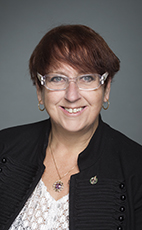Mr. Speaker, I am pleased to rise this evening to speak to Bill C-46, regarding driving while under the influence of cannabis or alcohol.
I do not disagree with Bill C-46, quite the contrary. No one here opposes the broader value of protecting drivers and our children. There are still too many deaths caused by drunk drivers, and much remains unknown about cannabis. However, we cannot talk about Bill C-46 without first talking about Bill C-45 on the legalization of cannabis.
With the bill to legalize cannabis, the government is trying to shift the responsibility to the provinces. If we want to give effect to Bill C-45, then we also have to give the provinces a framework that would allow them to adapt to Bill C-46. We need to put structures in place to help our police officers, those who are on the roads, those who have to drive, or those who have to arrest people who are under the influence of alcohol or cannabis.
In my mind, Bill C-46 is full of holes and does not go far enough to establish a strong framework because not everything is defined in Bill C-45. Everything is downloaded, as we say, to the provinces, which must do everything themselves. Unfortunately, they will not have the time to adust because they will have only one year to prepare for the legalization of cannabis and the implementation of Bill C-46 on driving under the influence of alcohol or cannabis.
This leads me to say that there is no mention of prevention in Bill C-45, and yet we will need information and prevention because driving under the influence of cannabis or any other drug is a big unknown. The support of all members of the House is contingent upon having a framework that protects our children, relatives, and friends so that they are not taken from us by irresponsible drivers. We need a coherent law.
Bill C-46 follows Bill C-45. If we want to legalize marijuana, we must ensure that Bill C-46 provides a much stronger framework to help our cities, police officers, and the people who work with the victims of traffic accidents. We do not see this in Bill C-46 or in Bill C-45.
Furthermore, Bill C-45 is a botched bill. The Liberals did not consider the ideas of those who work with people who have are addicted to alcohol or drugs such as cannabis. Everyone in the House knows someone, either a family member or a friend, who abuses cannabis. I believe that Bill C-46 needs to be fleshed out.
Our police officers need a little more support, and I am not just talking about money. Everyone involved needs education.
There have been shock advertising campaigns about drunk driving in Quebec. The ads did not stop people from drinking, but they did make people a little more informed. Now people call a cab or have a designated driver. We should do the same for cannabis.
We cannot talk about Bill C-46 without also talking about Bill C-45, which comes before Bill C-46. I will be voting to send it to committee, but it needs more teeth and it needs to be totally unassailable because Bill C-45 is an empty shell. The government is handing things over to the provinces, and they have to figure out how to deal with it. This is where the bill was drafted, and this is where we need to give it more teeth.
Personally, I think that the coming-into-force date for Bill C-45, 2018, is unrealistic. That is way too soon for the provinces, and it is way too soon considering all the conversations that need to happen with municipalities. How is the government going to make sure that the message in Bill C-46 gets to the municipalities, the provinces, the decision-makers, the organizations, the police officers, and everyone else involved in the day-to-day implementation of this bill? We must never forget that we are here to protect Canadians.
On this side of the House, we want to protect Canadians, and we want to make sure that the bills we pass contain all the necessary provisions, which is not the case with Bill C-45. I think that is what all parliamentarians think of these two bills. If we want to pass Bill C-46, Bill C-45 must have more teeth. Bill C-46 needs to establish structures that will help support and protect our drivers, our children, our parents, and people who work with individuals arrested for impaired driving. We also need to ensure that the right elements are in the right place. We need to ensure that any devices used to detect alcohol or cannabis are very sophisticated. Still today, breathalyzers are not 100% accurate.
I would like Bill C-46 to have more teeth, because it is missing an important element from Bill C-45, that is, ensuring that everyone affected by legalizing cannabis has all the resources needed to ensure that this legislation is rock solid. One year is far to soon for the municipalities and for everyone involved in enforcing this bill.

